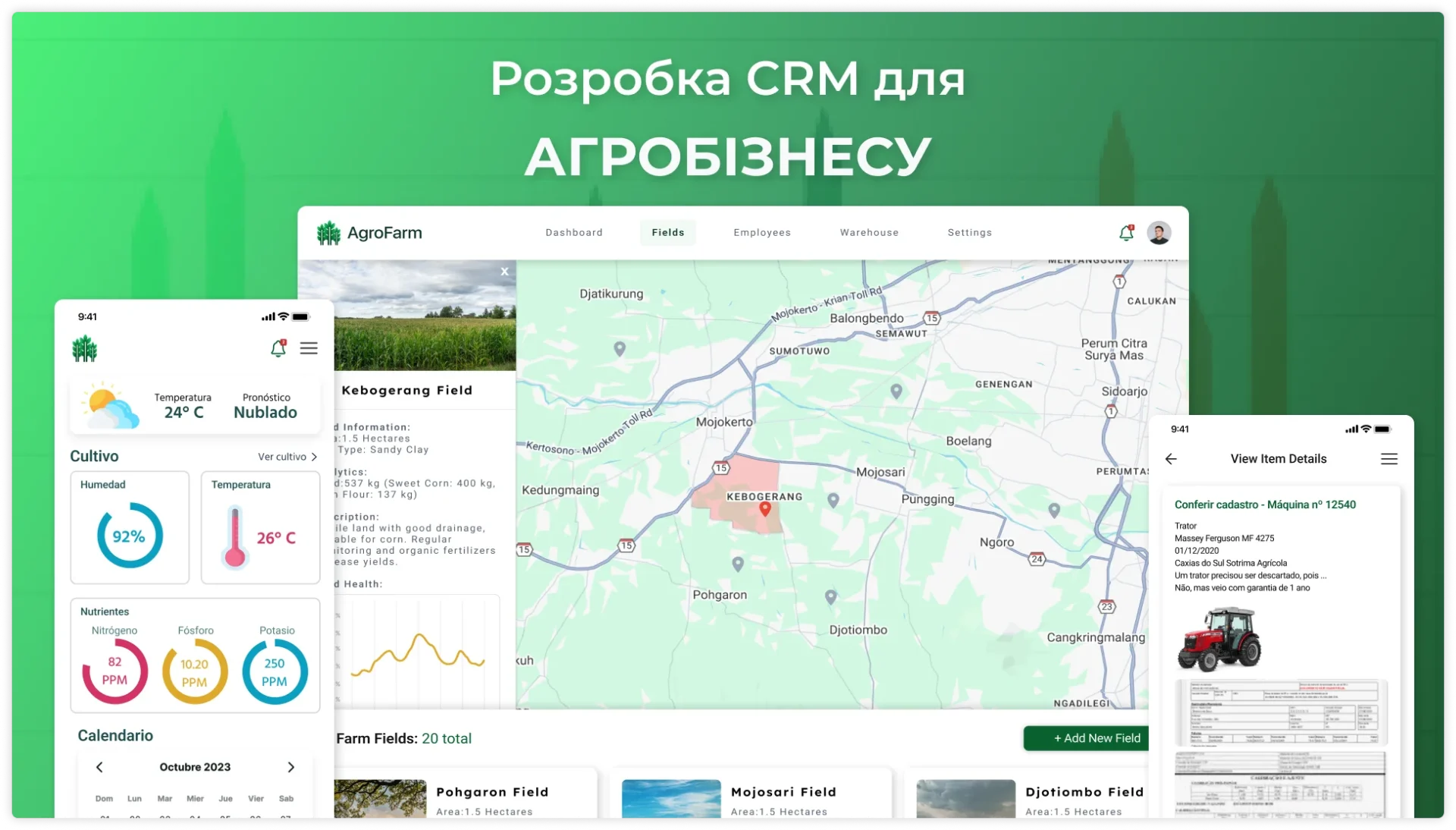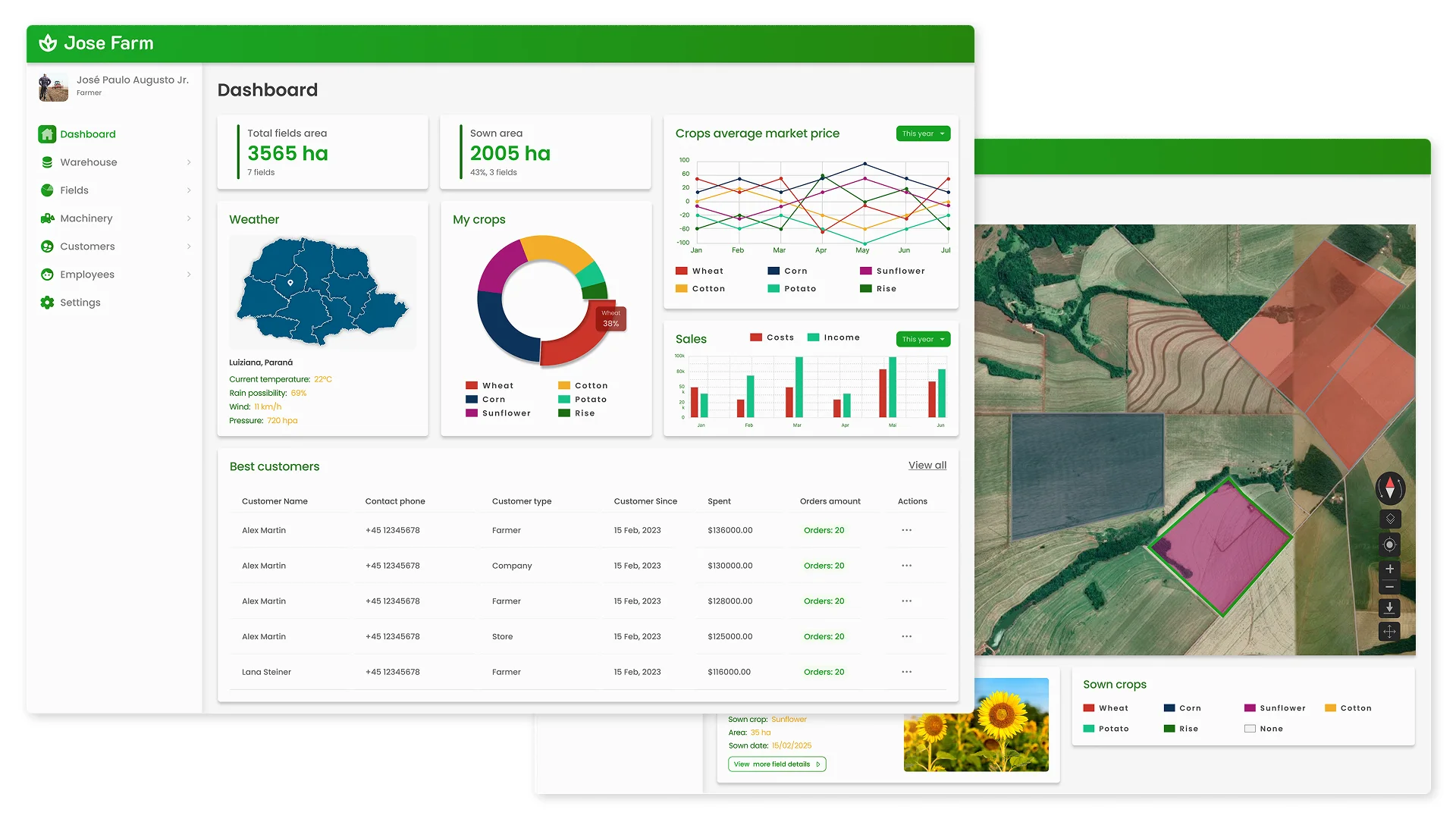
Agribusiness is rapidly developing along with technological progress – everything that seemed like an innovation yesterday has become a standard today. Farmers need not only labor and equipment, but also farm automation. Crop management, yield control, livestock accounting, supply logistics – now all this can be combined in one platform. CRM for agriculture is a powerful tool for data mining, planning, and improving farm profitability.
AVADA MEDIA offers the development of CRM systems for agriculture, adapted to the unique business processes of your enterprise. We create innovative solutions that allow you to control all aspects of agricultural production and automate key tasks, bringing your business to a new level.
CRM is not just an accounting program for agriculture, it is a comprehensive system for managing customers, resources, processes and analytics. It will allow farmers to:
For example, the automation of a dairy farm will free you from such tasks as milk yield accounting and product quality control, make livestock management, animal health control and employee productivity more efficient. The program for farmers helps to keep accurate records of all resources, from seeds to fuel, preventing losses and abuse.

Unlike standard solutions, individually developed CRM systems for agriculture can include modules for field management, agronomic data accounting, production planning, logistics and finance.
Agricultural automation is critical when the scale of the business is growing, and the control over supplies, sales, and costs is carried out manually, taking a lot of time. If you want to make informed decisions guided by analytical data, you need comprehensive automation of the agro-industrial enterprise.
CRM system for farming
AVADA MEDIA’s dedicated development teams adhere to an algorithm that allows you to create effective and reliable CRM systems for agribusiness that meet the needs of agribusiness.
At the start, a detailed study of the specifics of agribusiness is carried out – whether it is a large agricultural complex or a small farm, the goals and problems of the customer are determined, and existing management tools are analyzed.
Based on the analysis, a detailed project plan is developed, which determines the functional and non-functional requirements for the CRM system, integration with other systems, and interface requirements.
At this stage, the architecture of the CRM system is developed, the main modules and their interconnections, databases and API integrations are determined. They create schemes of user flows, simulate scenarios for user interaction with the system. At the same time, interactive interface prototypes are being developed, displaying the key elements of the system. Main screen layouts created using Moqups, Figma, Adobe XD tools help to test the CRM before direct development and make adjustments.
CRM design in Moqups environment
UX/UI designers create a modern and intuitive CRM system interface that reflects the style of your agricultural company and makes working with the system as comfortable as possible. Visual display of data, yield graphs, field maps – all this should be convenient and attractive to the user. It is important that farmers, agronomists and managers can easily use the system. A computer program for farmers should have an adaptive design for any device.
The main stage of CRM development for agricultural complexes and farms is divided into two blocks. Backend developers provide data processing and logic for working with external systems. Frontend developers implement the CRM user interface, optimize loading speeds and integration with dynamic dashboards for real-time data analysis Vue.js. responsiveness of the interface. Backend development is carried out using Node.js, Python, or PHP technologies.
Before the introduction of a CRM system for a farm, multi-level testing is carried out – modular, integrative and load. QA testers identify bugs, assess the correctness of all functions, check how the system copes with loads and interacts with other modules.
After successful testing, the CRM system is deployed on the customer’s servers or in the cloud, the system is configured and data is transferred, and staff training is provided so that employees can effectively use the new tool in their work.
After the implementation of the program, it is important not only to maintain its performance, but also to provide it with technical support, regular updates and integration of new functions. The management system should grow with your business and adapt to changes.
We develop CRM systems for agribusiness that help agribusiness work more efficiently by automating key processes: from sowing planning and crop accounting to warehouse and logistics management. Our software solutions simplify communication with suppliers and customers, allowing you to quickly process orders and analyze data. Experienced developers take into account the specifics of the agricultural sector, creating flexible and reliable solutions that grow with your business.
Can I use a CRM to predict yields?
Customized CRM systems for agricultural complexes can integrate with meteorological services and soil sensors so that you can predict yields with high accuracy.
What does the cost of developing a CRM for agribusiness depend on?
The price of a CRM system for a farm depends on the functionality, complexity of integrations, the number of users and individual customer requirements. We create flexible solutions that fit your budget and challenges.
How does the program help to manage agricultural machinery?
The program for agricultural workers allows you to keep records of all equipment, track its condition, plan maintenance and repairs, as well as optimize the use of equipment in the fields.
Is it possible to use a CRM system for warehouse management?
With the help of a management system, you can keep track of inventory, track their movement, plan purchases and prevent shortages or surpluses of materials.
How can you manage your land bank and lease with CRM?
The program allows you to keep records and optimize the use of land plots, control the lease terms.
Does the system help control the quality of products?
CRM for the farm allows you to control all stages of production – from sowing to harvesting, compliance with quality standards, and keeping records of the results of laboratory tests.
How does CRM for agribusiness differ from universal management systems?
A custom CRM for farms takes into account seasonality, agricultural machinery management, yield control, and other aspects specific to the agricultural sector. We offer an individual development of a CRM system that takes into account the specifics of your business, your needs and goals.
Can the program take into account weather conditions?
Yes, it is possible to integrate weather services to analyze climatic conditions and predict yields.
How does a CRM system for agribusiness help manage resources?
The accounting program for agriculture allows you to track and predict deliveries, control stocks of fertilizers, seeds and other resources. With the help of integration with GPS tracking, you can monitor the movement of equipment, fuel consumption and timely maintenance.
Is it possible to manage farms in different regions using CRM?
The program supports the management of several farms, you can coordinate the work of branches and analyze the effectiveness of each of them.
Our works
Contact the experts Have a question?
Developed by AVADA-MEDIA™
The user, filling out an application on the website https://avada-media.ua/ (hereinafter referred to as the Site), agrees to the terms of this Consent for the processing of personal data (hereinafter referred to as the Consent) in accordance with the Law of Ukraine “On the collection of personal data”. Acceptance of the offer of the Consent is the sending of an application from the Site or an order from the Operator by telephone of the Site.
The user gives his consent to the processing of his personal data with the following conditions:
1. This Consent is given to the processing of personal data both without and using automation tools.
2. Consent applies to the following information: name, phone, email.
3. Consent to the processing of personal data is given in order to provide the User with an answer to the application, further conclude and fulfill obligations under the contracts, provide customer support, inform about services that, in the opinion of the Operator, may be of interest to the User, conduct surveys and market research.
4. The User grants the Operator the right to carry out the following actions (operations) with personal data: collection, recording, systematization, accumulation, storage, clarification (updating, changing), use, depersonalization, blocking, deletion and destruction, transfer to third parties, with the consent of the subject of personal data and compliance with measures to protect personal data from unauthorized access.
5. Personal data is processed by the Operator until all necessary procedures are completed. Also, processing can be stopped at the request of the User by e-mail: info@avada-media.com.ua
6. The User confirms that by giving Consent, he acts freely, by his will and in his interest.
7. This Consent is valid indefinitely until the termination of the processing of personal data for the reasons specified in clause 5 of this document.
Send CV
Contact us in any convenient way for you:
+ 38 (097) 036 29 32